PROJECT
Lo schermo dell’arte Film Festival presents the eight edition of VISIO – European Programme on Artists’ Moving Images.
VISIO consists of an exhibition and a series of seminars and meetings dedicated to expanding the vision and themes of artists, who use moving images in their artistic practice. By promoting encounters and international mobility, VISIO has favoured the development of a wide network of institutions, artists and professionals working with moving images creating a significant archive by mapping a new generation of artists based in Europe. Over 700 visual artists have applied to participate in the first seven editions of the Programme.
The VISIO Programme, curated by Leonardo Bigazzi, will be held in Florence, within the context of the 12th Edition of Lo schermo dell’arte Film Festival (12th – 17th November 2019). The participants will be 12 young European artists who work with moving images; they will be selected through an open call, in collaboration with some of the most important European Art Academies, Schools and Artist Residencies. The deadline to apply is September 25th 2019.
Four years after its first exhibition, Lo schermo dell’arte returns to Palazzo Strozzi with VISIO. Moving Images After Post-Internet. The exhibition is in coherent continuity with the four previous exhibitions organized at Le Murate PAC (2018), Palazzo Medici Riccardi (2017), Cinema La Compagnia (2016) and Palazzo Strozzi (2015).
The VISIO Young Talent Acquisition Prize is confirmed for the fifth edition. It will be assigned to one of the participating artists and consists in the acquisition of one of his/her video works by the Seven Gravity Collection, a private Italian collection that focuses on video works by contemporary artists. Through this Prize Lo schermo dell’arte Film Festival, thanks to the partnership with the Seven Gravity Collection, aims to support young artists by promoting the practice of collecting moving images works and video installations.
Image: Driant Zeneli, Some say the moon is easy to touch…– video- 2011 – 04’43”- Courtesy prometeogallery di Ida Pisani Milan, Lucca
StruCTURE
VISIO – European Programme on Artists’ Moving Images has a 6-part structure:
1. VISIO. Moving Images After Post Internet: the exhibition, curated by Leonardo Bigazzi, displays the participants’ works and will take place in Palazzo Strozzi in Florence (12th of November – 1st of December 2019). The exhibition presents films and video installations that relate to the transformations generated by the digital revolution and the variety of means and formats used in contemporary video practice.
2. Festival: the participating artists are invited to attend screenings, meetings and lectures of the Festival’s official program, and are encouraged to actively participate in the discussions. The main topics will then be expanded and developed during the seminars and conversations with the curators and artists hosted by the Festival. This year’s edition will feature works by Jeremy Deller, Luca Vitone, Lawrence Abu Hamdan among the others.
3. VISIO. Young Talent Acquisition Prize: the Prize will be assigned to one of the participating artists and consists in the acquisition of one of his/her video work by the Seven Gravity Collection, a private Italian collection that focuses on video works from contemporary artists. The Prize will be assigned by the Founding Members of the Seven Gravity Collection and the winning artist will be announced in occasion of the closing night of Lo schermo dell’arte Film Festival.
4. Artists Presentation: the 13th of November 2019, the participating artists will be asked to introduce their work in a 15 minutes presentation. They will have the opportunity to present their artistic practice to the other participants and to a selected audience.
5. Seminars: a series of seminars will be conducted by artists and curators who will speak about various aspects of their artistic practice and research methods with the participants. The seminars, which will last 2 hours each, will be structured in such a way as to allow also moments of discussion and sharing of experiences between the professionals and the participants. In the previous editions the seminars have been conducted by Isaac Julien, Marine Hugonnier, Philippe-Alain Michaud, Filipa Ramos, Deimantas Narkevicius, Mark Nash, Maria Lind, Alain Fleischer and Heinz Peter Schwerfel, Sibylle Kurz, Sarah Perks, Erika Balsom, Shirin Neshat, and Manuel Cirauqui.
6. Conversation room: in this informal environment participants will meet, in 40 minutes round tables and individual encounters, artists, curators, critics, producers and directors of international institutions hosted by the Festival. Ranging from the presentation of their own portfolios to simple conversations, these moments are conceived as an occasion for encounters and exchanges that can foster the participants’ professional growth and extend their networks of international contacts.
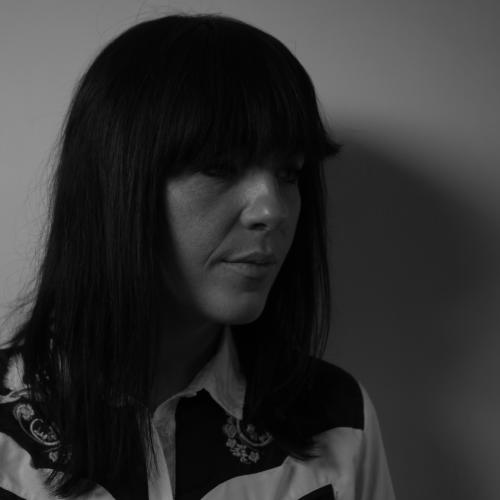
Rebecca Jane Arthur
Rebecca Jane Arthur is a visual artist working predominantly with the moving image and writing. In 2017 she obtained her MFA in Media Arts at the Royal Academy of Fine Arts, Ghent in Belgium, and her BFA from Project Studio at Sint-Lukas Brussels and the Video and Video Installation Department at the Academy of Fine Arts Vienna in 2015. Her works revolve around portraits of people and places, and her interest lies in how personal stories depict a socio-political context. She recently exhibited her work at Beursschouwburg, Brussels; Size Matters, Vienna; Tallinn Photomonth: Contemporary Art Biennial; ARGOS Centre for Art and Media, Brussels; Convent, Ghent; Courtisane Festival: Notes on Cinema, Ghent, among others. Texts on her work have been published in Metropolis M and KORTFILM.be. Arthur’s own writing on moving image has recently been published by Sabzian.
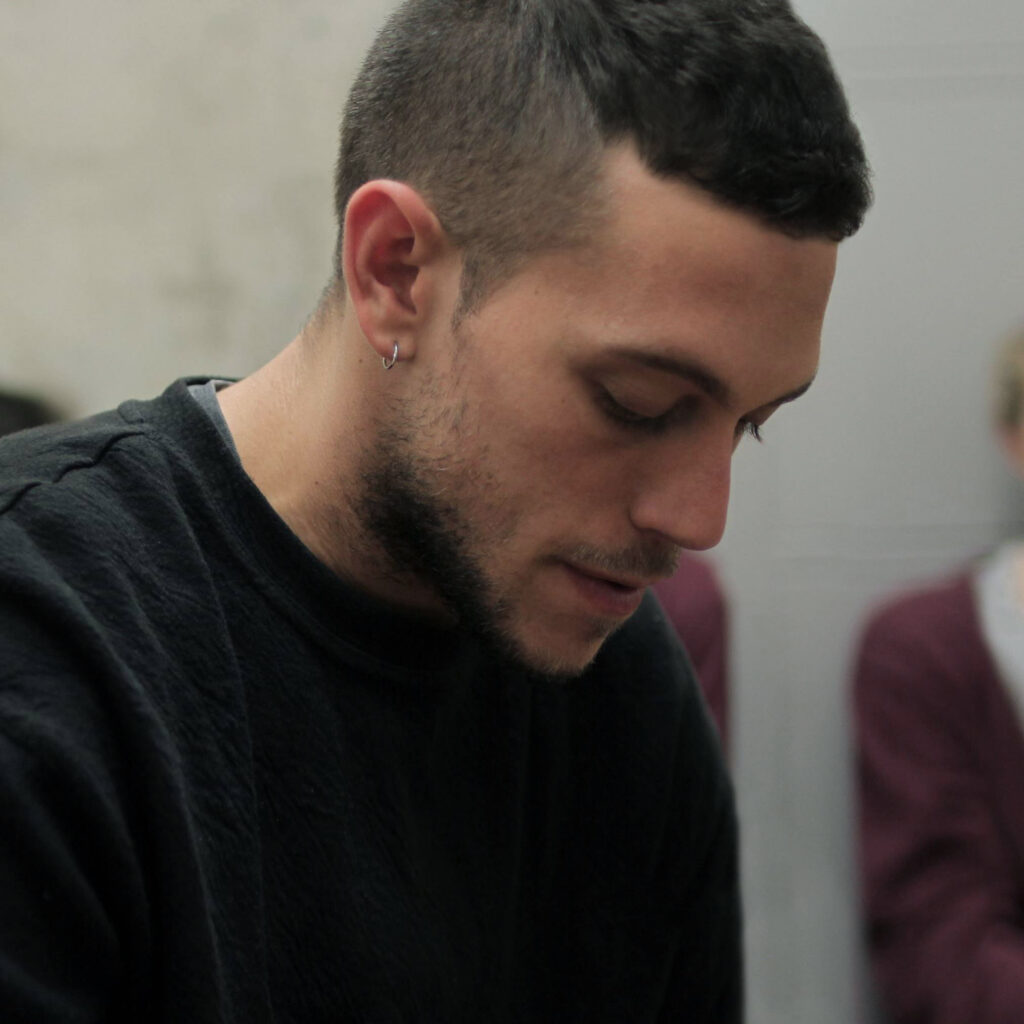
Miguel Azuaga
Miguel Azuaga holds a degree in Fine Arts from the University of Malaga and a Master Degree in Art in Context from the Universität der Künste Berlin, where he mainly focused on artistic practices within social groups and in the context of scientific and media image production. His works investigate the memory and psychology of trauma through the retelling of biographical events. Azuaga explores the condition of self in a postcolonial discourse thoroughly influenced by the mainstream and the popular culture. His work has recently focused on the paradigms of representation, intersectionality and social construct by putting the concept of “Europeanness” into question. His work has been shown at Goethe Institut Barcelona, the Universität der Künste Berlin, Loop Videoart Festival in Barcelona, Bilbao Exhibition Center, and the Museo de Arte de la Diputación de Malaga.
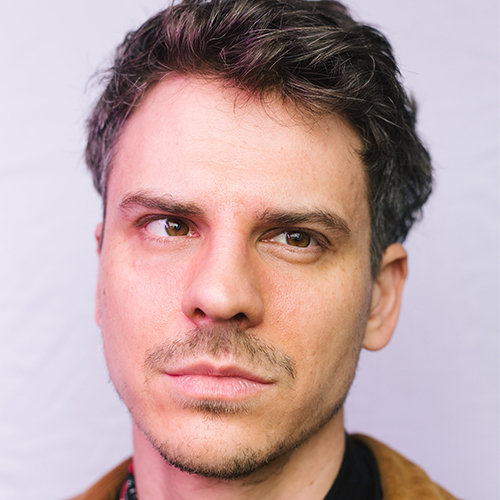
Patrick Alan Banfield
WINNER OF THE FIFTH EDITION OF “VISIO YOUNG TALENT ACQUISITION PRIZE”
Patrick Alan Banfield received a B.A. in Pedagogy and Media Studies from the University of Karlsruhe in 2009. From 2010 he studied Media Arts in the class of Isaac Julien at HfG Karlsruhe and fine arts in the class of Willem de Rooij at Städelschule HfbK Frankfurt am Main, where he graduated in 2015. After that he studied with Omer Fast from 2016-2018 at HfG Karlsruhe. In his works he researches forms of masculinity embedding his filmic production in spatial installations. His filmic works have been already presented in several group shows and film festivals, such as the Copenhagen International Documentary Film Festival (2012); De Ateliers, Amsterdam (2013); Galerie 1m3, Lausanne (2013); Loop Videoart Festival, Barcelona (2013); Festival de Video en Bourgogne (2013); Berlin Biennale (2014); Kulter A-Lab, Amsterdam (2015); Museum für Moderne Kunst, Frankfurt am Main (2015); Museum für neue Kunst, Freiburg (2018); Mewo-Kunsthalle Memmingen (2018).
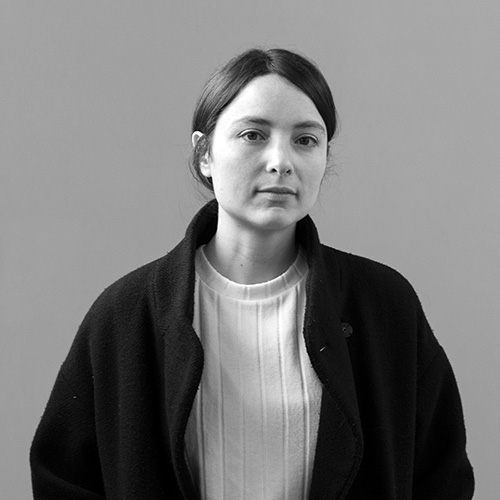
Enar de Dios Rodríguez
Enar de Dios Rodríguez is graduated in Translation and Fine Arts. Her artistic production includes photography, video, websites, poetry, installations and drawings. Her role as an artist strives to instigate reflection on alternative imaginaries, to dislocate fixed geo-political structures in exhibition spaces for unlocking new meanings. Her work has been exhibited at the Contemporary Jewish Museum, San Francisco; Künstlerhaus, Vienna; Laznia Centre for Contemporary Art, Gdańsk; or in festival such as L’OEil d’Oodaaq, Nantes and Ars Electronica, Linz. She has been the recipient of the Murphy and Cadogan Contemporary Art Award, San Francisco, the BMWF Scholarship, Vienna, or the Creadores Residency Grant, Málaga. She has given talks at the Academy of Fine Arts in Vienna, the University of California, Berkeley and Stanford University.
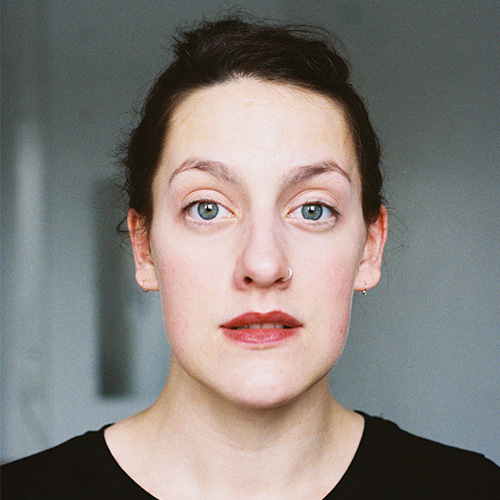
Eva Giolo
Eva Giolo is a musician, audio visual artist and filmmaker. She obtained her BFA and MFA from the Media Arts Department at the Royal Academy of Fine Arts, Ghent in Belgium and Kanazawa College of Art, Japan. Giolo’s work is made of filmic portraits; it shows a propensity to capture familial stories – of her own or of another’s. Her work was shown at Size Matters, Vienna; FIDMarseille; M HKA, Antwerp; Courtisane Festival, Ghent; Kunsthalle Wien; Rencontres International Paris/Berlin; Imagine Science Film Festival, New York; Côté court, Paris. Eva Giolo is a founding member of elephy, a Brussels-based production and distribution platform for film and media art. She is currently a post-grad art resident at HISK in Ghent (2018-2020) and will start the WIELS residency in Brussels in 2020.
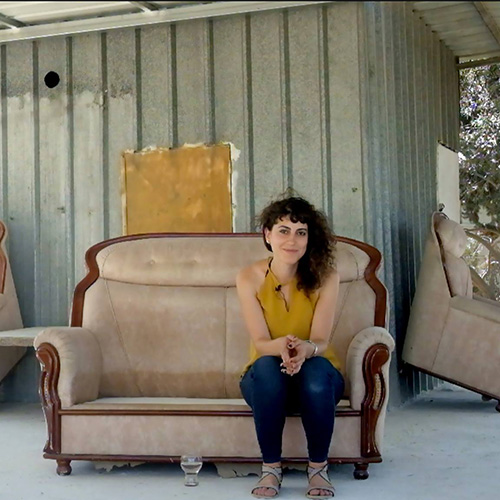
Inas Halabi
Inas Halabi works primarily with film and archival material to examine historical and political narratives of national identity, collective memory, and myth-making. Her practice merges observations with site specific research and is concerned with how social and political forms of power are manifested. She holds an MFA from Goldsmiths College in London and recently completed a two year residency at De Ateliers in Amsterdam. In 2016, she was awarded first prize for the A.M. Qattan Foundation’s Young Artist of the Year. She has recently shown and projected her works at: Silent Green Betonhalle, Berlin; Smith College Museum of Art, USA; al-Ma’mal Foundation for Contemporary Art, Jerusalem; OFF-Biennale Budapest, and the 13th Sharjah Biennial’s offsite project, Shifting Ground.
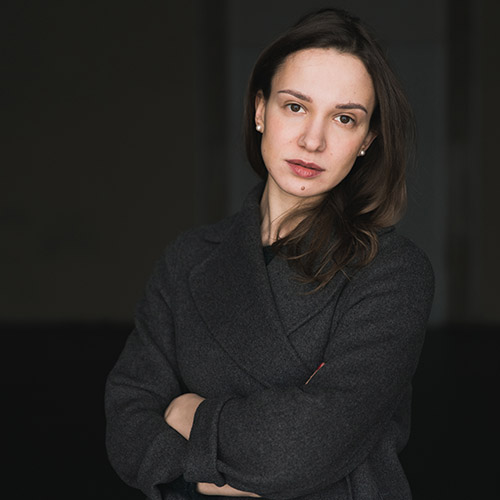
Polina Kanis
Polina Kanis is a graduate of the Herzen State Pedagogical University of Russia and of the Rodchenko Moscow Art School of Photography and Multimedia. In 2011 she was awarded the Kandinsky Prize in the Best Young Artist. In 2016 she received the Sergey Kuryokhin Award in the Media Object category for her video The Pool (2015). In her films each movement references the almost invisible routines, procedures, conventions, and mechanisms that are imposed on the human body and mind to make them conform to social protocols. Her work has been featured in numerous solo and group exhibitions, including a solo show in Haus der Kunst Munich (2017), the parallel program of Manifesta 10 and the 2015 edition of the Ural Industrial Biennial of Contemporary Art. In 2017—2018 she was a resident artist in the Rijksakademie van beeldende kunsten program in Amsterdam.
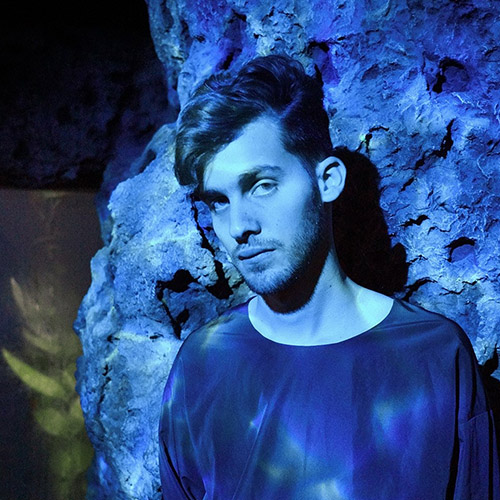
Adam Kaplan
Adam Kaplan is a graduate of The Bezalel Academy in Jerusalem and at Universität der Künste Berlin. Focusing on nostalgia, club culture and the “military entertainment complex”, his works deals with the way pop culture defines our memory. Growing up as a gamer in 1990’s Jerusalem, he was influenced by the intense relation between political turmoils and technological shifts of that time: military occupation on the television, exploding busses on the street, GTA on the computer. A mode of mixed perception between computer gameplays, news narratives and CGI realities. He has presented his work at various exhibitions and festivals, including Berlinale Forum Expanded, HKW (Berlin), ICA London, CCA Tel Aviv, Salt Galata (Istanbul), and CPH:DOX (Copenhagen).
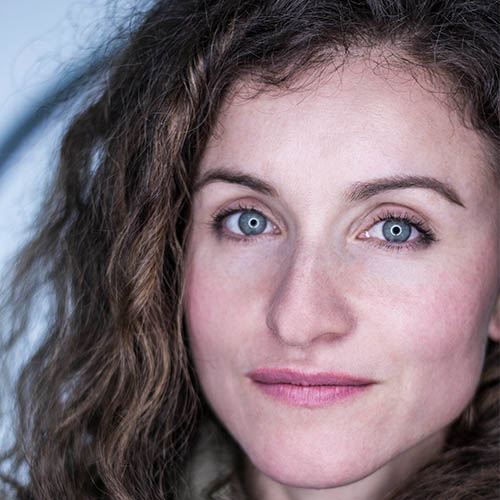
Valentina Knežević
Valentina Knežević is an artist and film director. In 2012 she received M.A. in Theater, Film and Media Studies at the Goethe University, Frankfurt/Main. In 2019 she completed her studies of fine arts at the Städelschule, Frankfurt/Main as a master student of Douglas Gordon. Her videowork VOICEOVER was funded through Film Board of State Hesse and VOICEOVER II through Culture Fond RheinMain and Aventis Foundation. The works reflect on the trauma and the social and psychological dynamics of the professional army through the direct soldiers testimony. Her films and other works have been shown at International Kurzfilmtage Oberhausen; Haus der Kulturen der Welt, Berlin; Palais de Tokyo, Paris; Kunsthalle Baden-Baden, Germany; Bangkok Biennale, Minokamo City Museum, Minokamo, Japan; Donau Festival, Krems, Austria.
Valentina Knežević
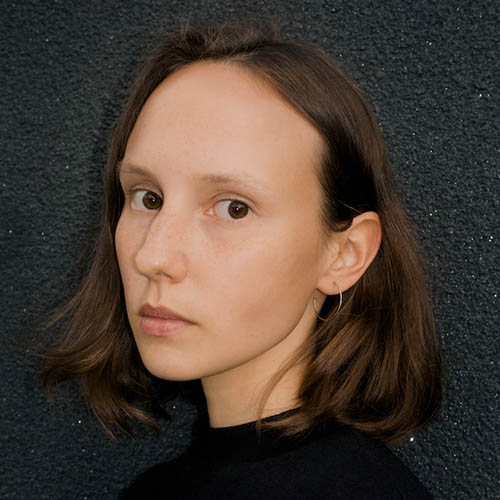
Agnieszka Mastalerz
Agnieszka Mastalerz in 2016 obtained a B.A. degree in Cultural Studies from the University of Warsaw. Between 2017 and 2018 she obtained a M.A. at the Studio of Spatial Activities by the professor Mirosław Bałka at the Academy of Fine Arts in Warsaw, and was a visiting student in Adam Broomberg and Oliver Chanarin’s studio at the Hochschule für Bildende Künste in Hamburg. She has received a DAAD scholarship to study at HBK Braunschweig in Candice Breitz/Eli Cortiñas’ studio. In her work she analyzes mechanisms of control and processes affecting the behaviour of each individual, as well as oppressive relationships established between human beings, natural environment and technologies within the companies. In 2017 she won the 16th Hestia Artistic Journey competition for young Polish artists. Her works were presented in art institutions such as Museum of Modern Art in Warsaw; Zachęta National Gallery of Art in Warsaw; Starak Family Foundation in Warsaw; Otwock Studio, Old Brewery in Poznań; TRAFO Centre for Contemporary Art in Szczecin; Fondation Hippocrène in Paris; Deichtorhallen in Hamburg.
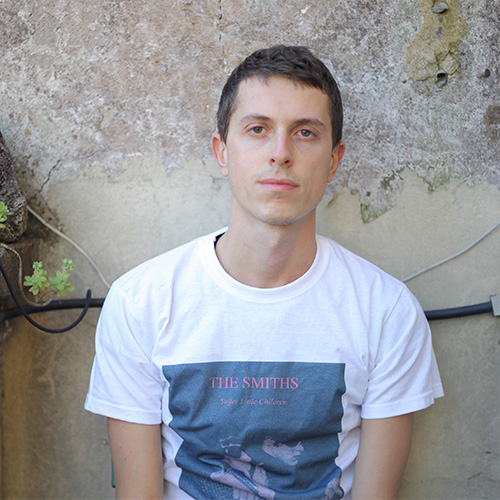
Jacopo Rinaldi
Jacopo Rinaldi is an artist, educator and researcher. He studied at the Academy of Fine Arts in Rome and specialized as a fellow in the Visual Arts and Curatorial Studies course at the Naba in Milan with a thesis on the relationship between the Harald Szeemann’s archive and the architectural space that preserves it. He works as a teacher and lab assistant at Naba in Rome. Through photography, drawing and moving images he analyzes the relationship between memory, archive and architecture in the transmission of knowledge. His works have recently been exhibited in numerous associations and institutions, including: PAV, Parco Arte Vivente, Turin; MACRO, Rome; LeWitt Studio, Spoleto; Casa Testori, Novate Milanese; Casa Masaccio, San Giovanni Valdarno; Fondazione Francesco Fabbri, Pieve di Soligo; Rivoli2, Rome. He took part in residency programs such as Mahler LeWitt Studios / Viaindustriae, Careof, Viafarini, Fondazione Spinola Banna, Fondazione Pistoletto, associazione Ramdom, dOCUMENTA (13).
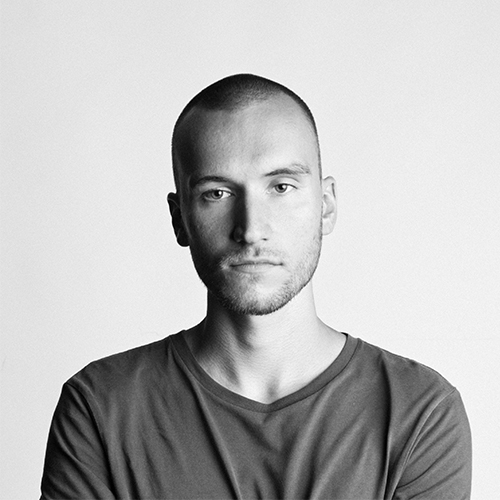
Igor Simić
Igor Simić is an artist, filmmaker and writer. He graduated from Columbia University, New York, with a Bachelor in Film Studies and a Bachelor in Philosophy. His short films – most notably The Thinker in the Supermarket and Melancholic Drone – were screened and awarded in film festivals such as Loop Videoart Festival, Barcelona; Alternative Film/Video Festival, Belgrade; Interfilm Film Festival, Berlin; Thessaloniki International Film Festival. With works in private and public collections, Simić is represented by Galerie Anita Beckers, Frankfurt. Simić is the creative director and CEO of the award-winning gaming and transmedia company Demagog Studio, which published in 2018 the Apple-featured, story-driven game Golf Club: Wasteland with the original soundtrack Radio Nostalgia from Mars.
EXHIBITION
VISIO. Moving Images After Post-Internet.
Four years after its first exhibition, Lo schermo dell’arte returns to Palazzo Strozzi with VISIO. Moving Images After Post-Internet. The exhibition offers an insight into the practice of a generation of artists who, during the years of their education, witnessed the rise of the so-called “Post-Internet condition”.
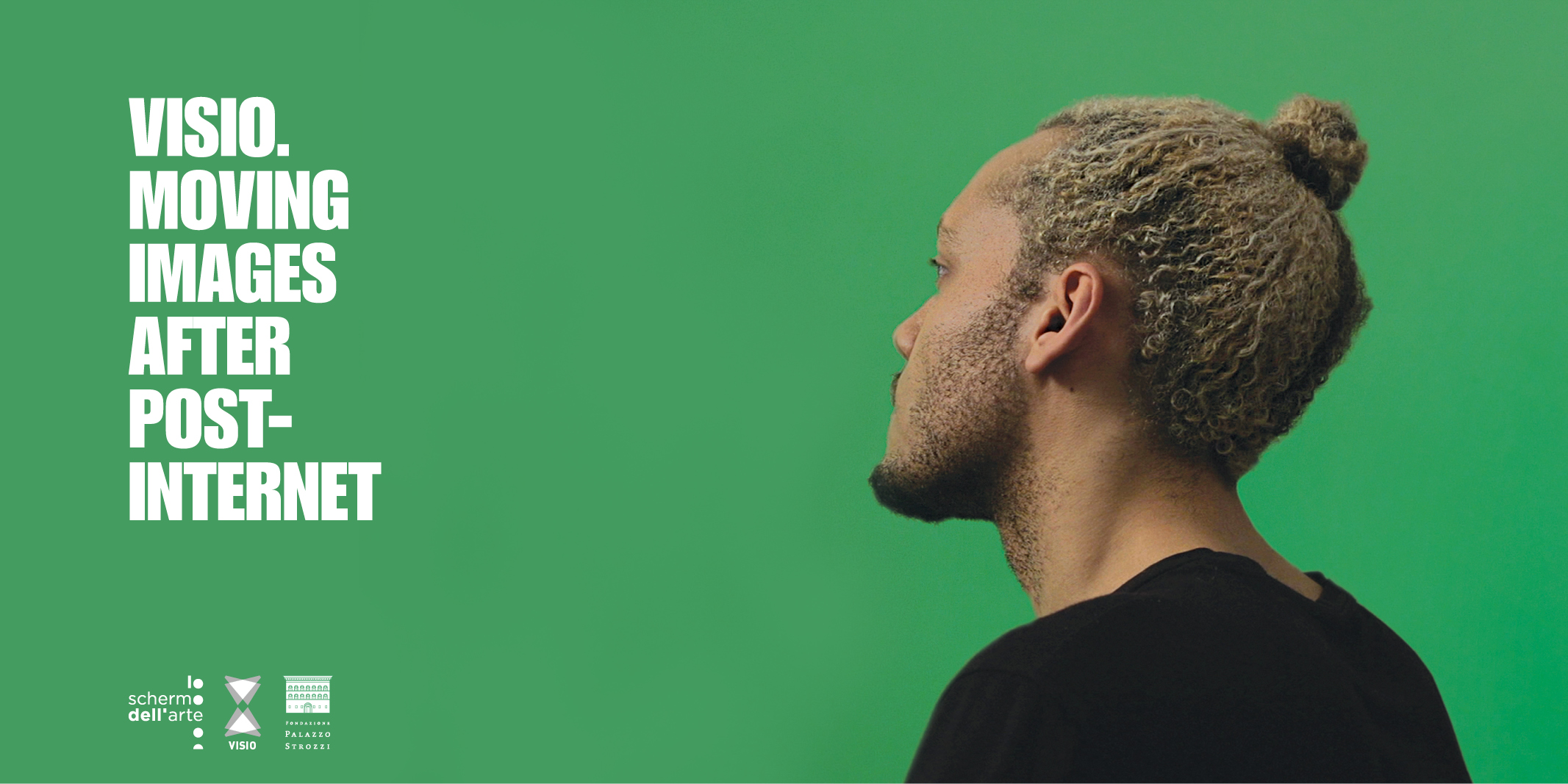
VISIO. European Programme on Artists’ Moving Images 8th edition
curated by Leonardo Bigazzi
promoted and organized by Lo schermo dell’arte Film Festival
in collaboration with
Fondazione Palazzo Strozzi and FST-Mediateca Regionale Toscana
with the contribution of
Regione Toscana
Comune di Firenze
La Compagnia / progetto realizzato nell’ambito del Programma Sensi Contemporanei Toscana per il Cinema
Fondazione Cassa di Risparmio di Firenze
the support of
In Between Art Film
ottod’Ame
Famiglia Cecchi
B&C Speakers
Mercato Centrale
Golden View Firenze
The selection of the participants is conducted in partnership with
- Accademia di Belle Arti di Brera, Milano
- Accademia di Belle Arti di Firenze
- Art House (Scutari)
- Careof, Milano
- De Ateliers, Amsterdam
- HIAP – Helsinki International Artist Programme
- Le Fresnoy-Studio national des arts contemporains, Tourcoing
- Rijksakademie van beeldende kunsten, Amsterdam
- Royal College of Art, Londra
- Royal Danish Academy of Fine Arts, Copenhagen
- Royal Institute of Art, Stoccolma
- Sandberg Instituut, Fine Arts, Amsterdam
- Städelschule, Francoforte,
- Universität der Künste Berlin
- WIELS, Contemporary Art Centre, Bruxelles
